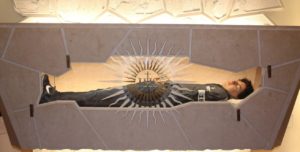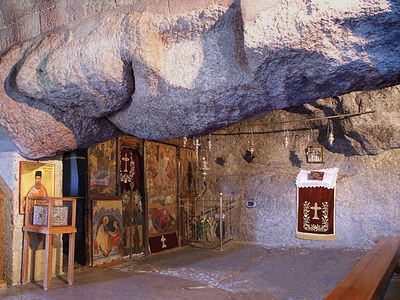 Revelation: Removing the VeilThis revelation was given by God to the Apostle John because we needed to know it.
Revelation: Removing the VeilThis revelation was given by God to the Apostle John because we needed to know it.
“>Part 1, 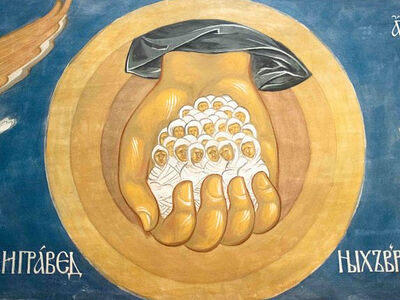 If Christ Is With Us, Death Is DefeatedThe book of Revelation teaches us a lot, especially when we begin to carefully delve into its words, when we see how Christ holds the world in His hands and acts with wisdom in all things.”>Part 2,
If Christ Is With Us, Death Is DefeatedThe book of Revelation teaches us a lot, especially when we begin to carefully delve into its words, when we see how Christ holds the world in His hands and acts with wisdom in all things.”>Part 2, 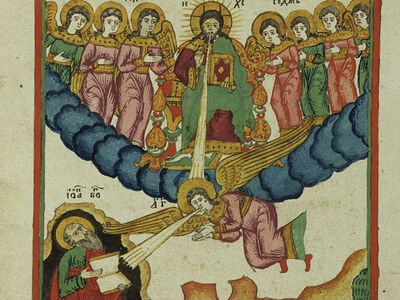 Why Did the Lord Leave Man the Book of Revelation?Only the people of God, the saints, can receive revelations from God, and only they can interpret them, because a revelation, words from God, is given from God, from the Holy Spirit.”>Part 3,
Why Did the Lord Leave Man the Book of Revelation?Only the people of God, the saints, can receive revelations from God, and only they can interpret them, because a revelation, words from God, is given from God, from the Holy Spirit.”>Part 3, 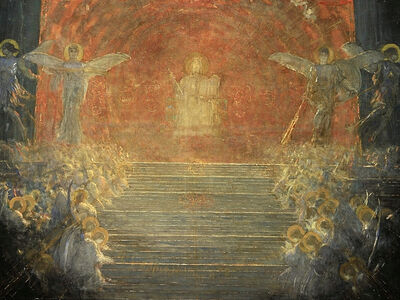 For the Time Is at Hand…We have to understand that God acts outside of time, and the events of Revelation don’t relate only to the end times.”>Part 4,
For the Time Is at Hand…We have to understand that God acts outside of time, and the events of Revelation don’t relate only to the end times.”>Part 4,  Blessed Is He That Readeth…Christ sent the revelation through an angel to His servant the Apostle and Evangelist John, who conveyed the word of God and the testimony of Jesus Christ about what he saw and heard.”>Part 5,
Blessed Is He That Readeth…Christ sent the revelation through an angel to His servant the Apostle and Evangelist John, who conveyed the word of God and the testimony of Jesus Christ about what he saw and heard.”>Part 5,  He Hath Made Us Kings and PriestsA man who is close to God, my dears, truly feels like a king—he has no need of anything. At the same time, he may have absolutely nothing.”>Part 6,
He Hath Made Us Kings and PriestsA man who is close to God, my dears, truly feels like a king—he has no need of anything. At the same time, he may have absolutely nothing.”>Part 6,  John, Our Companion in Tribulation, and in the Kingdom and Patience of Jesus ChristOne of the most significant and frequent references to the Holy Trinity is in the text of Revelation.”>Part 7,
John, Our Companion in Tribulation, and in the Kingdom and Patience of Jesus ChristOne of the most significant and frequent references to the Holy Trinity is in the text of Revelation.”>Part 7,  Because Thou Hast Left Thy First Love…The greatest miracle is that the Church exists.”>Part 8,
Because Thou Hast Left Thy First Love…The greatest miracle is that the Church exists.”>Part 8,  Fear None of Those Things Which Thou Shalt SufferThus, God says the following: He is the First and the Last, the Beginning and the End. Nothing exists outside of Him; in Him is everything. He is the Beginning and End of all things.”>Part 9,
Fear None of Those Things Which Thou Shalt SufferThus, God says the following: He is the First and the Last, the Beginning and the End. Nothing exists outside of Him; in Him is everything. He is the Beginning and End of all things.”>Part 9,  Holding Fast to the Name of ChristTo hold fast the name of God is a blessing; it’s martyrdom, and it’s a confession.”>Part 10
Holding Fast to the Name of ChristTo hold fast the name of God is a blessing; it’s martyrdom, and it’s a confession.”>Part 10
We continue reading the book of Revelation. The 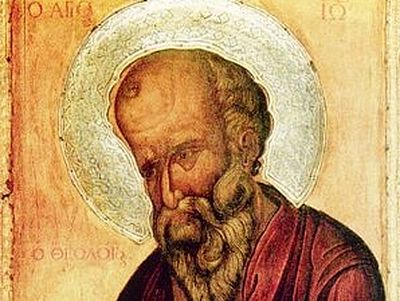 Saint John the Theologian, Apostle and EvangelistThrough humility, not calling himself by name, nevertheless speaking of himself in the Gospel, refers to himself as the disciple ”whom Jesus loved.” This love of him by the Lord, showed itself when the Lord was on the cross he entrusted His Most Holy Mother to him saying: ”Behold your mother.”
Saint John the Theologian, Apostle and EvangelistThrough humility, not calling himself by name, nevertheless speaking of himself in the Gospel, refers to himself as the disciple ”whom Jesus loved.” This love of him by the Lord, showed itself when the Lord was on the cross he entrusted His Most Holy Mother to him saying: ”Behold your mother.”
“>Apostle and Evangelist John, while on the island of Patmos, on the Lord’s Day, saw Christ before him in great glory, Who told him some things about the bishops of the seven Churches of Asia Minor. He calls the bishops the angels of the Churches. We already read the epistles to the bishops of the Churches of Ephesus, Smyrna, and Pergamos.
 Apostle John the Theologian and his disciple, the Apostle Prochorus
Apostle John the Theologian and his disciple, the Apostle Prochorus
Now we turn to the epistle to the angel of the Church of Thyatira: And unto the angel of the Church in Thyatira write; These things saith the Son of God, Who hath his eyes like unto a flame of fire, and his feet are like fine brass (Rev. 2:18). Do you remember how the Apostle John saw Christ? His feet were like fine brass, a precious metal, and his eyes like flames of fire. He saw Him in such striking glory. Christ asks to write to the bishop about the following: I know thy works, and charity, and service, and faith, and thy patience, and thy works; and the last to be more than the first (Rev. 2:19). First the Lord tells him about good deeds—this bishop had love, faith, patience, and served sincerely. His last works were greater than the first. Notwithstanding I have a few things against thee, because thou sufferest that woman Jezebel, which calleth herself a prophetess, to teach and to seduce My servants to commit fornication, and to eat things sacrificed unto idols (Rev. 2:20). You see, God speaks very directly and sincerely to man. God doesn’t play tricks us on and doesn’t laugh at us. God doesn’t act like we do: “Should I tell him or not? Maybe he’ll misunderstand me. I hope he doesn’t think anything bad about me, doesn’t get offended.”
God speaks directly. Of course, only God can do this, not us, because we don’t see the soul of another as God sees it. But when the Church speaks about something, for example, it doesn’t allow heretics to commune, it doesn’t allow us to pray together with heretics, it calls something a heresy or delusion, then it speaks about it very definitely. And we start arguing that that it didn’t need to be said, that it’s better to do everything with love, it’s better not to tell someone, so as not to hurt him, that God is for everyone…
Such manifestations of love, of course, aren’t real. We think we have love by behaving this way. But deeds and actions that harm another can’t be called love. Like a doctor, despite all his love for you, should tell you the truth. And it’s important that you tell the truth for the doctor to make the correct diagnosis. If a doctor, out of love, doesn’t want to give a diagnosis, and says: “Mama, what a wonderful child you have, a creation of God; it’s impossible that he’d be sick with something; go home.” But the child could die on the way. The doctor has to diagnose, he has to understand what’s happening with the boy, and tell the patient about it. No matter how much he loves you, he must, unfortunately, tell you about your problem. That’s the only way to cure someone.
When the Church makes a “spiritual diagnosis,” it says: “This is a delusion, a heresy, it cuts you off from the Church of Christ and Divine Communion.” The Church acts this way not because it hates or rejects anyone. It acts this way with the goal of healing a man with all its love, with all its sincerity; it calls things as they are for the sake of saving a man. We can’t tell someone: “Don’t worry, my dear, we’re all the same; we all believe in one God, we’re all children of God.” That’s a mistake. You can’t tell someone: “Don’t worry.” You’ll harm him. I have problems with blood sugar, and you’ll start saying: “Don’t worry, eat some cake—nothing bad will happen. And if you’re still hungry, eat some more.” Okay, thank you very much for your love, but that’s ruinous for me. Of course, I’ll eat everything; it’ll all be gone in a minute, but what then? Such love is destructive.
You can’t tell a heretic: “It doesn’t matter. We’re all God’s people. You believe in God too.” You harm him this way. Tell him the truth. “I love you, very much, I value your deeds, but you have some problems. You’re outside the Church. You can’t prosper outside the Church; you need to enter the Church.” Just as Christ says: “I know your deeds; I know you’re a good person, that you love God.”
 The Holy Fathers and the shamed heretics. Fresco from the Patriarchate of Peć in Kosovo
The Holy Fathers and the shamed heretics. Fresco from the Patriarchate of Peć in Kosovo
Quite often, both I and other spiritual fathers face such difficulties. Someone comes to see you, a Freemason. He asks: “Can I receive Communion? Can I be in the Church?” You say: “Stop! Freemasonry, Masonic lodges, altars, and the Church are not compatible with each other. Masonic lodges are one thing and the Church of Christ is another.”
The man might resist, resent, come and go a hundred times, but by refusing, we leave him the opportunity to be saved.
One day, a Catholic, a very pleasant man, a university teacher, came to see our Elder on the Holy Mountain. He told the Elder:
“You know, I love Orthodoxy, the Holy Fathers; I read the Holy Fathers (and indeed, he knew the works of the Church Fathers very well), I try to live in an Orthodox manner, but I can’t leave my church, Catholicism.”
The Elder responded:
“You’re a good man, and everything you do is very good. But you don’t belong to the Church; you’re outside of the Church.”
The Catholic started walking back and forth. The Elder was adamant. I remember, this Catholic teacher spent three or four days in bed; we offered him to get up and eat something, but nothing helped. We were worried he was going to die.
“Have some tea!”—no answer. He had experienced a great shock. We asked the Elder to talk with him a bit.
“Leave him alone. Nothing bad will happen to him,” the Elder said.
And indeed, nothing happened. The Catholic struggled with himself and came and went for three years before he decided to become Orthodox.
 Westminster Abbey, London
Westminster Abbey, London
“If you want to enter the Church, there’s no other path. There’s one Church of Christ, not ten.”
We believe “in One, Holy, Catholic, and Apostolic Church.” There can’t be many Churches—that’s heresy. This man suffered to accept it. But it’s the truth. Had the Elder said to him: “My son, don’t worry! Stay where you are; since you read the Fathers and you try to live like an Orthodox Christian, that’s good enough,” then nothing would have come out of it. The man suffered, was sick from the blow, but managed to come out of it and accept the truth, get baptized, and become Orthodox. Today he’s an Orthodox priest in Rome, in Italy; he tries to labor spiritually. Now he talks about what he had to go through.
The truth often shakes us; it’s hard for us to receive it. But you can’t tell someone else: “Don’t worry, live however you want.” He tells you he’s married but he meets up with another woman when he has free time. When his wife annoys him, he can go to the other woman for comfort and enjoyment.
“My dear son, that’s not how it’s done.” “No worries, it was our mutual decision.” You can’t do that. If you want, do as you know how; you have the right—you’re a free man. But that’s not how to do it. He’s suffering, he’s in pain; he eats himself up on the inside until he decides to stop. And if you tell him: “It’s okay, of course, you need comfort, you’re still young, you can repent when you’re older,” then this man is lost.
God doesn’t lie to people
God doesn’t  The Ninth Instruction. That One Should Not LieI wish to remind you, O brethren, about lying, for I see that you do not strive very hard to restrain your tongues and from this we are easily drawn into much evil. Make note my brethren that in every matter, as I constantly tell you, one may acquire a habit either for the good or for the evil; and so one needs great heedfulness so that we will not be robbed by lying, for one who lies has no union with God. Lying is foreign to God.
The Ninth Instruction. That One Should Not LieI wish to remind you, O brethren, about lying, for I see that you do not strive very hard to restrain your tongues and from this we are easily drawn into much evil. Make note my brethren that in every matter, as I constantly tell you, one may acquire a habit either for the good or for the evil; and so one needs great heedfulness so that we will not be robbed by lying, for one who lies has no union with God. Lying is foreign to God.
“>lie to people. You see, here He’s telling the bishops the truth. He also speaks about the good things: I know thy works, and charity, and service, and faith, and thy patience, and thy works; and the last to be more than the first. Notwithstanding I have a few things against thee. What is He talking about? Because thou sufferest that woman Jezebel, which calleth herself a prophetess, to teach and to seduce My servants to commit fornication, and to eat things sacrificed unto idols (Rev. 2:19-20).
We don’t know for sure if the bishop had a wife Jezebel, because bishops were mostly married in the early centuries of Christianity. Perhaps he really was married to a Jezebel, who was a false prophetess, teaching people the heresy of the Nicolaitanes, who said you can achieve salvation by giving in to bodily passions and lusts, fornication, and the like. Or this bishop allowed this heresy in his Church. It was his fault for allowing heretics to present themselves as prophets and teach the servants of God falsehoods, that fornication and eating food offered to idols is permissible, that there’s nothing terrible in this.
The Nicolaitan heresy greatly disturbed the early Church, because Nicholas was one of the seven deacons chosen by the Holy Spirit; he was an important, revered person in the Church.
 The Apostle Peter ordains the seven deacons, fresco of the New Tokali Church in Cappadocia
The Apostle Peter ordains the seven deacons, fresco of the New Tokali Church in Cappadocia
But he became an heresiarch, teaching that asceticism isn’t just fasting, prayer, and abstinence, but also another endeavor—engaging in carnal lusts to overcome your body and your very self. It’s a delusion, but it penetrated into the Church and disturbed it. The heresiarch Nicholas also proposed freely eating food offered to idols—meat sacrificed to false gods. God didn’t want the bishop to accept such things. Christ doesn’t want such things; He says: I have a few things against thee.
There have always been false brethren in the Church, false Christians, false prophets. And there still are today. If you turn on the TV, you’ll see various prophets and prophetesses. They work “miracles,” every night they “see” the Theotokos, every day they “see” Christ. Unfortunately, there are people who believe this. Such satanic gifts have always existed, and they are always opposed to the gifts of the Holy Spirit.
It continues: And I gave her space to repent of her fornication; and she repented not (Rev. 2:21). The Lord gave this woman (or this heresy) time for repentance, but she didn’t want to give up her sins. Fornication isn’t only a carnal sin but also a spiritual departure from God. Man is called to marriage with Christ. Christ wants to be the Bridegroom of our soul.
When a man moves towards sin, it’s spiritual fornication. He departs from God and contracts a marriage with sin and satan. Behold, I will cast her into a bed, and them that commit adultery with her into great tribulation, except they repent of their deeds (Rev. 2:22). The Lord will leave them where they sin; they will be punished by their deeds. They will experience great tribulations through this; they will go through trials. God won’t punish, but our deeds will punish us and exact a toll from us. Satan is man’s worst enemy. Sin will never lead us to good; it brings only evil, torment, and suffering. It’s the consequence of our deeds, not the punishment of God.
 Gustave Doré, Illustration to Milton’s Paradise Lost, 1866
Gustave Doré, Illustration to Milton’s Paradise Lost, 1866
And I will kill her children with death; and all the Churches shall know that I am He Which searcheth the reins and hearts: and I will give unto every one of you according to your works (Rev. 2:23). The word of God is harsh. It doesn’t mean God will kill these children. Every sin brings death. Sin gives birth to death; the consequences of sin are fatal, they lead to spiritual death, the most terrible kind. The soul withers. Sin isn’t terrible because it’s a kind of transgression of the law of God. When you break the law, you ask for forgiveness, and that’s the end of it. But sin has a terrible consequence—it kills. The soul withers through sin. Anyone who knows the state when his soul is alive, how he prays and is close to God, immediately feels like he’s turned into a corpse if he happens to sin. He’s not moved by anything anymore. If before that he was moved by the very name of Christ, his heart began to tremble, tears flowed, he hurried to church to receive Communion, to be at Vigil with desire and love, he forgot everything to experience something spiritual, then man dies in sin: Even if he sees Christ in front of him, he feels nothing. 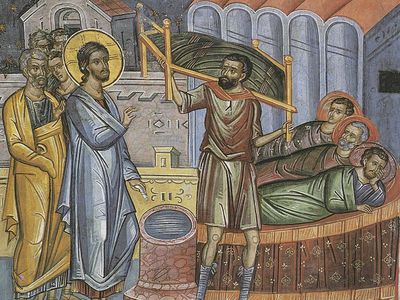 Sin is DestructiveDeath, infirmity, temporality and susceptibility to passions entered this world with the sin; they are interwoven. Sin destroys everything in a man, both his body and his soul. Any doctor is perfectly aware of it.
Sin is DestructiveDeath, infirmity, temporality and susceptibility to passions entered this world with the sin; they are interwoven. Sin destroys everything in a man, both his body and his soul. Any doctor is perfectly aware of it.
“>Sin is the death of the soul.
I am He Which searcheth the reins and hearts: and I will give unto every one of you according to your works (Rev. 2:23). Christ uses the expression “search the reins and heart” speaking of Himself in the Old and the New Testaments. This is one of the proofs that the One Who spoke in the Old Testament is the pre-Incarnate Christ, the un-incarnate Word of God. In the New Testament, the Incarnate Word speaks, so He uses the same expressions that in the Old Testament belonged to Yahweh, the Lord. In the New Testament, they belong to Christ.
Why does He search the reins and the heart? At that time, people believed that the heart contains a man’s memories and thoughts, that it’s the center of everything; and the reins1 were the center of all desires. The Lord will reward everyone according to their deeds; He’s the Judge of the universe. Again, these are words from the Old Testament. Knowing these words, you can answer Jehovah’s Witnesses who say that Christ was created, that He wasn’t in the Old Testament.
To be continued…

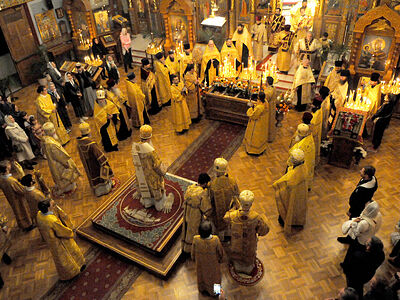 30th anniversary of uncovering of incorrupt relics of St. John (Maximovitch) celebrated in San Francisco (+VIDEOS)One of America’s greatest saints was celebrated in California over the weekend.
30th anniversary of uncovering of incorrupt relics of St. John (Maximovitch) celebrated in San Francisco (+VIDEOS)One of America’s greatest saints was celebrated in California over the weekend. ROCOR pastoral conference dedicated to St. John (Maximovitch) held at San Francisco cathedral (+VIDEO)The conference, held at the Holy Virgin, Joy of All Who Sorrow Cathedral, home to the relics of St. John, was dedicated to the 30th anniversary of his glorification.”>in April of this year.
ROCOR pastoral conference dedicated to St. John (Maximovitch) held at San Francisco cathedral (+VIDEO)The conference, held at the Holy Virgin, Joy of All Who Sorrow Cathedral, home to the relics of St. John, was dedicated to the 30th anniversary of his glorification.”>in April of this year. 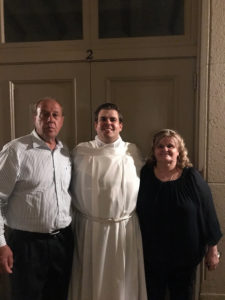

 UOC bishop-abbot faces years in prison for sermon mentioning roadblocks, monastic brotherhood respondsThe Ukrainian Security Service (SBU) detained His Eminence Metropolitan Arseny of Svyatogorsk, the abbot of the Holy Dormition-Svyatogorsk Lavra, yesterday. According to a court ruling, he is to be held in a pre-trial detention center for 60 days without the possibility of bail.
UOC bishop-abbot faces years in prison for sermon mentioning roadblocks, monastic brotherhood respondsThe Ukrainian Security Service (SBU) detained His Eminence Metropolitan Arseny of Svyatogorsk, the abbot of the Holy Dormition-Svyatogorsk Lavra, yesterday. According to a court ruling, he is to be held in a pre-trial detention center for 60 days without the possibility of bail. Security Service raids offices of Orthodox journalists and lawyersOne of the four men detained is the rector of a church in the capital.”>journalists who are being unjustly detained.
Security Service raids offices of Orthodox journalists and lawyersOne of the four men detained is the rector of a church in the capital.”>journalists who are being unjustly detained.  Persecuted Metropolitan Longin attacked at home, has to undergo surgery”This happened on the night of January 22, 2024. Someone knocked on the door three times, and when I opened it, I was struck and knocked unconscious.”
Persecuted Metropolitan Longin attacked at home, has to undergo surgery”This happened on the night of January 22, 2024. Someone knocked on the door three times, and when I opened it, I was struck and knocked unconscious.” Metropolitan of Montenegro in support of persecuted Ukrainian Metropolitan-Abbot of Svyatogorsk LavraThe Serbian hierarch is himself no stranger to state persecution.
Metropolitan of Montenegro in support of persecuted Ukrainian Metropolitan-Abbot of Svyatogorsk LavraThe Serbian hierarch is himself no stranger to state persecution. Persecuted Ukrainian hierarchs are confessors of the Orthodox faith—Serbian hierarch’s open letterHis Grace Bishop Gerasim of the Gornji Karlovac Diocese of the Serbian Orthodox Church in Croatia published an open letter in support of the UOC and its persecuted hierarchs on Wednesday, May 15.”>last week in defense of all the persecuted hierarchs, clergy, monastics, and faithful of the canonical Ukrainian Orthodox Church.
Persecuted Ukrainian hierarchs are confessors of the Orthodox faith—Serbian hierarch’s open letterHis Grace Bishop Gerasim of the Gornji Karlovac Diocese of the Serbian Orthodox Church in Croatia published an open letter in support of the UOC and its persecuted hierarchs on Wednesday, May 15.”>last week in defense of all the persecuted hierarchs, clergy, monastics, and faithful of the canonical Ukrainian Orthodox Church.  Revelation: Removing the VeilThis revelation was given by God to the Apostle John because we needed to know it.
Revelation: Removing the VeilThis revelation was given by God to the Apostle John because we needed to know it. If Christ Is With Us, Death Is DefeatedThe book of Revelation teaches us a lot, especially when we begin to carefully delve into its words, when we see how Christ holds the world in His hands and acts with wisdom in all things.”>Part 2,
If Christ Is With Us, Death Is DefeatedThe book of Revelation teaches us a lot, especially when we begin to carefully delve into its words, when we see how Christ holds the world in His hands and acts with wisdom in all things.”>Part 2,  Why Did the Lord Leave Man the Book of Revelation?Only the people of God, the saints, can receive revelations from God, and only they can interpret them, because a revelation, words from God, is given from God, from the Holy Spirit.”>Part 3,
Why Did the Lord Leave Man the Book of Revelation?Only the people of God, the saints, can receive revelations from God, and only they can interpret them, because a revelation, words from God, is given from God, from the Holy Spirit.”>Part 3,  For the Time Is at Hand…We have to understand that God acts outside of time, and the events of Revelation don’t relate only to the end times.”>Part 4,
For the Time Is at Hand…We have to understand that God acts outside of time, and the events of Revelation don’t relate only to the end times.”>Part 4,  Blessed Is He That Readeth…Christ sent the revelation through an angel to His servant the Apostle and Evangelist John, who conveyed the word of God and the testimony of Jesus Christ about what he saw and heard.”>Part 5,
Blessed Is He That Readeth…Christ sent the revelation through an angel to His servant the Apostle and Evangelist John, who conveyed the word of God and the testimony of Jesus Christ about what he saw and heard.”>Part 5,  He Hath Made Us Kings and PriestsA man who is close to God, my dears, truly feels like a king—he has no need of anything. At the same time, he may have absolutely nothing.”>Part 6,
He Hath Made Us Kings and PriestsA man who is close to God, my dears, truly feels like a king—he has no need of anything. At the same time, he may have absolutely nothing.”>Part 6,  John, Our Companion in Tribulation, and in the Kingdom and Patience of Jesus ChristOne of the most significant and frequent references to the Holy Trinity is in the text of Revelation.”>Part 7,
John, Our Companion in Tribulation, and in the Kingdom and Patience of Jesus ChristOne of the most significant and frequent references to the Holy Trinity is in the text of Revelation.”>Part 7,  Because Thou Hast Left Thy First Love…The greatest miracle is that the Church exists.”>Part 8,
Because Thou Hast Left Thy First Love…The greatest miracle is that the Church exists.”>Part 8,  Fear None of Those Things Which Thou Shalt SufferThus, God says the following: He is the First and the Last, the Beginning and the End. Nothing exists outside of Him; in Him is everything. He is the Beginning and End of all things.”>Part 9,
Fear None of Those Things Which Thou Shalt SufferThus, God says the following: He is the First and the Last, the Beginning and the End. Nothing exists outside of Him; in Him is everything. He is the Beginning and End of all things.”>Part 9,  Holding Fast to the Name of ChristTo hold fast the name of God is a blessing; it’s martyrdom, and it’s a confession.”>Part 10,
Holding Fast to the Name of ChristTo hold fast the name of God is a blessing; it’s martyrdom, and it’s a confession.”>Part 10,  Sin Is Marriage with SatanSin will never lead us to good; it brings only evil, torment, and suffering. It’s the consequence of our deeds, not the punishment of God.”>Part 11
Sin Is Marriage with SatanSin will never lead us to good; it brings only evil, torment, and suffering. It’s the consequence of our deeds, not the punishment of God.”>Part 11 



 Saint John the Theologian, Apostle and EvangelistThrough humility, not calling himself by name, nevertheless speaking of himself in the Gospel, refers to himself as the disciple ”whom Jesus loved.” This love of him by the Lord, showed itself when the Lord was on the cross he entrusted His Most Holy Mother to him saying: ”Behold your mother.”
Saint John the Theologian, Apostle and EvangelistThrough humility, not calling himself by name, nevertheless speaking of himself in the Gospel, refers to himself as the disciple ”whom Jesus loved.” This love of him by the Lord, showed itself when the Lord was on the cross he entrusted His Most Holy Mother to him saying: ”Behold your mother.”




 Sin is DestructiveDeath, infirmity, temporality and susceptibility to passions entered this world with the sin; they are interwoven. Sin destroys everything in a man, both his body and his soul. Any doctor is perfectly aware of it.
Sin is DestructiveDeath, infirmity, temporality and susceptibility to passions entered this world with the sin; they are interwoven. Sin destroys everything in a man, both his body and his soul. Any doctor is perfectly aware of it.

